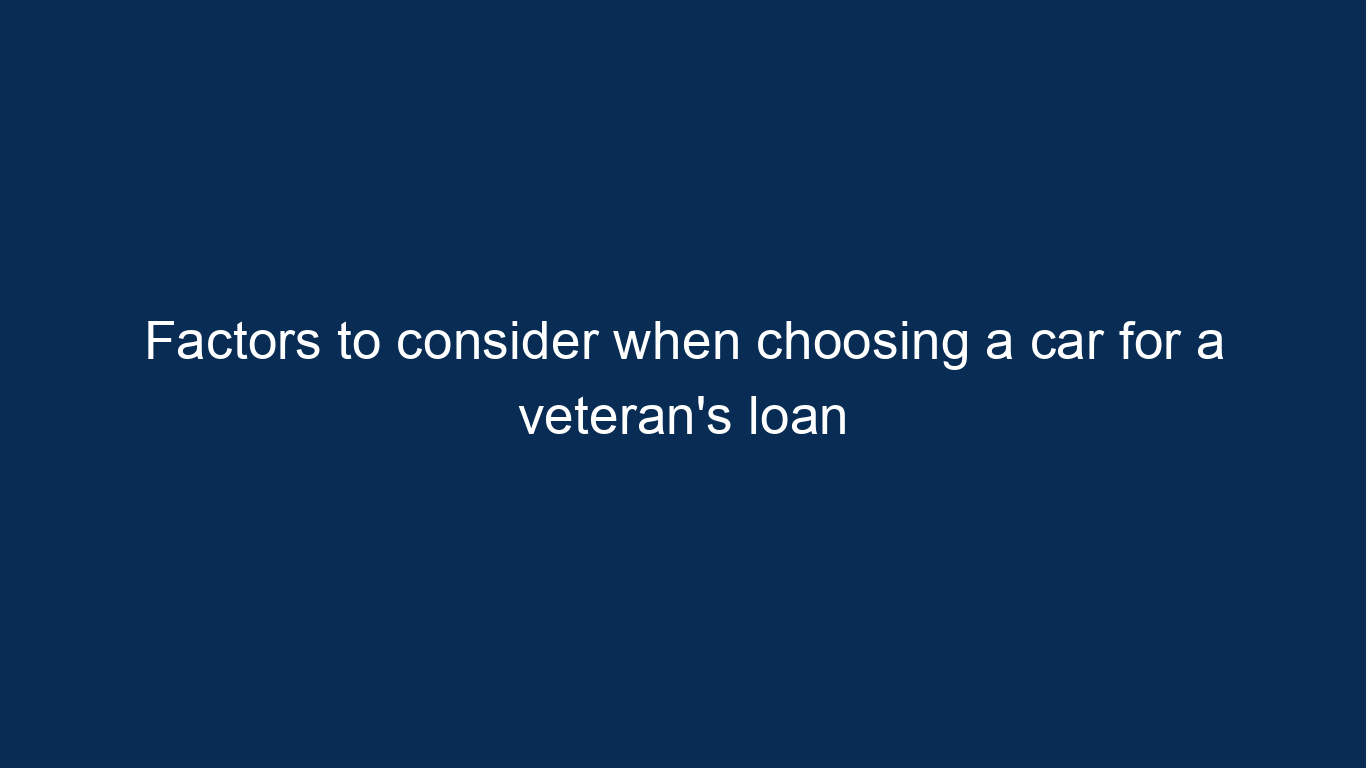When it comes to choosing a car for a veteran’s loan, there are several factors that need to be carefully considered. Veterans often have unique needs and preferences, and it is important to find a vehicle that suits their lifestyle and budget. Additionally, factors such as reliability, fuel efficiency, safety features, and accessibility should also be taken into account. This introduction will explore the key factors that veterans should consider when selecting a car for their loan, in order to make an informed decision that meets their specific requirements and enhances their overall driving experience.
“Understanding the Unique Needs of Veterans: Factors to Consider When Choosing a Car for a Veteran’s Loan”
When it comes to choosing a car for a veteran’s loan, there are several factors to consider. Veterans have unique needs and preferences, which should be taken into account to ensure they find a vehicle that suits their lifestyle and budget. This article will discuss some important factors to consider when choosing a car for a veteran’s loan, providing valuable information in a formal and informative writing style.
Firstly, it is crucial to consider the veteran’s specific needs and requirements. Some veterans may have physical disabilities resulting from their service, and therefore require a vehicle that is wheelchair accessible or equipped with adaptive features. Others may have specific preferences for size, style, or functionality. It is important to have open and honest communication with the veteran to determine their specific needs before choosing a car for their loan.
Secondly, the budget is a significant factor to consider. Veterans may have different financial situations, and it is important to find a car that fits within their budget. This includes not only the purchase price but also ongoing costs such as insurance, maintenance, and fuel. Researching and comparing different car models and their associated costs can help veterans make an informed decision within their financial means.
Additionally, it is essential to consider the reliability and durability of the car. Veterans, especially those who have experienced combat, may have a preference for vehicles that are known for their dependability and longevity. Researching the reliability ratings and reviews of different car models can help veterans make a choice that aligns with their desire for a durable vehicle.
Furthermore, safety features should be a top consideration when choosing a car for a veteran’s loan. Veterans may have experienced trauma or injuries during their service, and ensuring their safety on the road is paramount. Features such as advanced airbags, stability control, antilock brakes, and blind-spot monitoring can provide added peace of mind for veterans.
Lastly, it is important to consider the availability of veteran-specific benefits and incentives when choosing a car for a veteran’s loan. Many automakers offer special programs and discounts for veterans, such as reduced interest rates, cash rebates, or special financing options. Exploring these benefits can help veterans save money and make their car purchase more affordable.
In conclusion, choosing a car for a veteran’s loan requires careful consideration of their unique needs and preferences. Factors such as specific requirements, budget, reliability, safety, and available benefits should all be taken into account. By considering these factors in a formal and informative writing style, veterans can make an informed decision and find a car that meets their needs while maximizing their loan benefits.
“Navigating the Car Buying Process for Veterans: Key Factors to Keep in Mind for a Successful Loan”
When it comes to purchasing a car, veterans have unique considerations to keep in mind. Whether you served in the military recently or many years ago, understanding the key factors involved in the car buying process can help ensure a successful loan. In this article, we will discuss the important points to consider when navigating the car buying process as a veteran.
- Research and compare loan options: Before venturing into the car buying process, it’s crucial to research and compare loan options specifically tailored for veterans. Many financial institutions and lenders offer special deals and discounts for veterans, so be sure to explore these options. Look for competitive interest rates, favorable terms, and flexible repayment options that suit your needs.
- Check your credit score: Your credit score plays a significant role in determining the loan terms and interest rates you’ll be offered. Before applying for a car loan, obtain a copy of your credit report and review it for any errors or discrepancies. If you find any inaccuracies, take steps to rectify them. Additionally, consider taking measures to improve your credit score if it’s not in the optimal range. A higher credit score can lead to better loan terms and lower interest rates.
- Determine your budget: It’s essential to determine a realistic budget before starting the car buying process. Consider your monthly income, existing financial obligations, and future expenses to determine how much you can comfortably afford to spend on a car. Remember to account for not only the purchase price but also the associated costs such as insurance, maintenance, and fuel.
- Explore dealership discounts and incentives: Many car dealerships offer exclusive discounts and incentives for veterans. Some manufacturers have programs that provide special pricing or rebates to military personnel. Take advantage of these offers by researching which dealerships and manufacturers provide such benefits. These discounts can help you save money on your car purchase or provide additional features at no extra cost.
- Consider pre-approval: Getting pre-approved for a car loan can simplify the buying process and give you a better understanding of your budget. Contact lenders or financial institutions to obtain pre-approval, as this will give you a clear idea of how much you can afford and the interest rates you qualify for. Pre-approval also demonstrates to car dealerships that you are a serious buyer, potentially giving you more negotiating power.
- Research the car’s value and history: Before making a final decision, thoroughly research the car’s value and history. Look up the vehicle’s market value, considering factors such as its age, mileage, condition, and any additional features. Additionally, obtain a vehicle history report to check for any previous accidents, repairs, or other issues that may impact its value or performance. This information will help you make an informed decision and negotiate a fair price.
- Take a test drive and get a professional inspection: Always take the car for a test drive before committing to a purchase. During the test drive, pay attention to the vehicle’s handling, acceleration, brakes, and overall comfort. If possible, have a trusted mechanic inspect the car for any potential mechanical issues. This step will ensure you are making a sound investment and avoid unexpected repair costs in the future.
By keeping these key factors in mind, veterans can navigate the car buying process successfully and secure a loan that fits their needs and budget. Remember to research, compare loan options, check your credit score, determine your budget, explore discounts and incentives, consider pre-approval, research the car’s value and history, and take a
“Maximizing the Benefits of a Veteran’s Loan: Important Factors to Consider When Selecting a Car”
When it comes to selecting a car, there are several important factors that veterans should consider to maximize the benefits of their loan. Whether you are using a VA loan or any other type of financing, it is crucial to make an informed decision that suits your needs and preferences. In this article, we will discuss the key factors that veterans should take into account when selecting a car, ensuring that they make the most of their loan.
First and foremost, it is essential to consider the purpose of the vehicle. Are you looking for a reliable mode of transportation for daily commutes, or do you require a larger vehicle for family outings? Understanding your specific needs will help you narrow down your options and choose a car that fulfills those requirements.
Next, veterans should consider the cost of ownership. This includes not only the purchase price of the vehicle but also factors such as fuel efficiency, maintenance costs, insurance rates, and potential depreciation. By carefully evaluating these expenses, veterans can make a well-informed decision that aligns with their budget and financial goals.
Additionally, veterans should research the reliability and safety ratings of the vehicles they are considering. This information can be found through various sources such as consumer reports and online reviews. Opting for a car with a strong track record of reliability and high safety ratings can save veterans from potential headaches and ensure their peace of mind while on the road.
Furthermore, it is crucial to consider the resale value of the vehicle. While it may not be a top priority at the time of purchase, selecting a car with a good resale value can provide veterans with added financial flexibility in the future. This is especially important if they plan to upgrade or sell the vehicle down the line.
Another factor to consider is the availability of financing options. Veterans have the advantage of being eligible for VA loans, which often offer attractive interest rates and terms. However, it is still important to shop around and compare different lenders to ensure that you are getting the best possible financing terms for your car purchase.
Finally, veterans should carefully assess the features and technology offered by different vehicles. Modern cars come equipped with a wide range of features, such as advanced safety systems, infotainment systems, and connectivity options. It is crucial to prioritize the features that are most important to you and ensure that the vehicle you choose meets your expectations in terms of technology and convenience.
In conclusion, selecting a car as a veteran requires careful consideration of various factors. By understanding your needs, evaluating the cost of ownership, researching reliability and safety ratings, considering resale value, exploring financing options, and assessing features and technology, you can make an informed decision that maximizes the benefits of your loan. Remember to take your time, do thorough research, and consult with professionals if needed to ensure that you select the right car that meets your needs and works well within your budget.
In conclusion, there are several factors to consider when choosing a car for a veteran’s loan. Firstly, it is important to assess the specific needs and preferences of the veteran, such as the car’s size, style, and features. Additionally, the car’s reliability, fuel efficiency, and maintenance costs should be taken into account to ensure long-term affordability. Moreover, veterans should consider the loan terms, interest rates, and repayment options offered by different lenders to make an informed decision. Lastly, seeking professional advice and assistance, such as from a financial advisor or veteran support organizations, can greatly aid in making the right choice. By carefully considering these factors, veterans can select a car that meets their unique requirements and maximizes the benefits of their loan.






